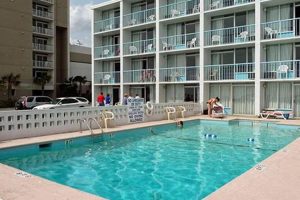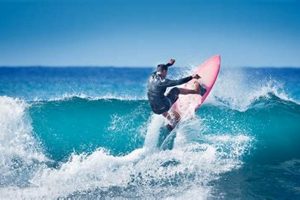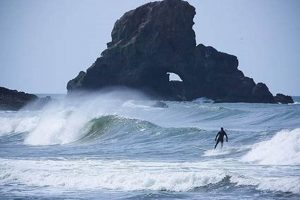An organized program providing instruction and practical experience in surfing, located on a specific coastal area in North Carolina, is under analysis. The entity offers a structured environment for individuals to learn or improve surfing skills, usually encompassing safety guidelines, wave knowledge, and board handling techniques at the designated location.
Participation in such a program can offer various benefits, including enhanced physical fitness, improved water safety knowledge, and an increased appreciation for coastal ecosystems. Historically, these types of programs have contributed to the growth of surfing culture in the region and the promotion of responsible ocean recreation.
The following sections will delve into specifics such as the typical curriculum, the qualifications of instructors involved, and the environmental impact considerations of operating such an entity. Further analysis will also cover logistical aspects like accommodation options and local attractions, thus providing a comprehensive overview.
Expert Guidance for a Successful Surf Camp Experience
The following recommendations are designed to maximize the benefit and enjoyment derived from participation in a surfing instructional program at this coastal location. These suggestions focus on preparation, safety, and responsible environmental interaction.
Tip 1: Physical Conditioning: Prior physical preparation is crucial. Implement a regimen that includes cardiovascular exercises, strength training, and flexibility exercises to enhance performance and reduce the risk of injury during surfing sessions.
Tip 2: Sun Protection: Consistent application of broad-spectrum, water-resistant sunscreen is essential to protect skin from harmful ultraviolet radiation. Reapply sunscreen frequently, particularly after water exposure.
Tip 3: Hydration Practices: Maintaining adequate hydration levels is paramount. Consume sufficient water throughout the day, especially before, during, and after physical activity in the marine environment. Electrolyte replacement may be considered during prolonged exertion.
Tip 4: Understanding Local Conditions: Familiarize oneself with prevailing weather patterns, tidal fluctuations, and potential hazards such as rip currents. Adherence to posted warnings and instructions from experienced instructors is mandatory.
Tip 5: Respect Marine Life: Observe marine animals from a safe distance and avoid any actions that could disturb or harm them. Refrain from feeding wildlife or interacting with nesting sites.
Tip 6: Equipment Familiarization: Acquire a working knowledge of surf equipment, including the surfboard and leash. Practice proper mounting and dismounting techniques in shallow water before venturing into deeper areas.
Tip 7: Surf Etiquette: Follow established surfing etiquette guidelines, such as respecting the right-of-way of other surfers and avoiding dropping in on waves already being ridden. Be aware of surroundings at all times.
Adherence to these suggestions will contribute significantly to a safe, educational, and environmentally responsible surfing experience. They are intended to enhance enjoyment while minimizing risks and impacts on the coastal environment.
The subsequent sections will examine the long-term sustainability of surf camps and their role in promoting ocean conservation.
1. Instructional Methodology
Instructional Methodology, as applied to surf camps in Wrightsville Beach, North Carolina, represents the systematic approach used to impart surfing skills and knowledge to participants. The effectiveness of the methodology directly influences the overall learning experience and the development of competent surfers.
- Progressive Skill Development
Progressive skill development involves a structured progression from fundamental techniques to more advanced maneuvers. Typically, programs begin with basic paddling, board handling, and standing techniques in shallow water before advancing to wave selection and riding. This phased approach allows participants to build confidence and proficiency gradually, minimizing the risk of injury and maximizing skill retention in the ocean environment.
- Personalized Coaching
Personalized coaching tailors instruction to individual skill levels, learning styles, and physical capabilities. Instructors assess each participant’s strengths and weaknesses and adapt their teaching methods accordingly. This individualized approach enhances learning efficiency and ensures that all participants receive appropriate support and guidance. Small group sizes often facilitate personalized attention.
- Safety Integration
Safety integration involves incorporating safety education and protocols into every aspect of the instructional program. This includes instruction on rip current identification and avoidance, water rescue techniques, and proper use of safety equipment such as leashes and life vests. Consistent reinforcement of safety principles is essential for preventing accidents and promoting responsible ocean recreation. Understanding environmental hazards, such as marine life and submerged objects, also falls under this facet.
- Video Analysis and Feedback
Video analysis and feedback utilize recorded surfing sessions to provide participants with visual feedback on their technique. Instructors can review footage with participants, identifying areas for improvement and demonstrating proper form. This method provides a more objective assessment than solely relying on in-water observation and can accelerate the learning process. Integration of video analysis requires appropriate equipment and expertise.
The successful integration of these facets within the instructional methodology of surf camps significantly contributes to the overall quality and effectiveness of the program. The methodology adopted directly impacts participants’ skill development, safety awareness, and appreciation for the coastal environment, making it a crucial component of any surfing instructional program in Wrightsville Beach, NC.
2. Safety Protocols
Safety protocols represent a critical element in the operational framework of any surf camp located in Wrightsville Beach, NC. The rigorous implementation of these protocols is paramount in mitigating inherent risks associated with water-based activities and ensuring participant well-being.
- Lifeguard Supervision and Water Rescue Procedures
Lifeguard supervision constitutes continuous monitoring of participants in the water, typically involving certified lifeguards trained in ocean rescue techniques. Water rescue procedures encompass established protocols for responding to emergencies, including swift and effective extraction of distressed individuals from the water. These measures are essential due to the dynamic nature of the ocean environment and the potential for unexpected hazards. Regular drills and equipment checks are standard practice to maintain readiness.
- Rip Current Awareness and Avoidance Training
Rip currents pose a significant threat to surfers and swimmers; thus, comprehensive training in their identification and avoidance is vital. Educational sessions typically cover the visual cues indicating rip current presence and strategies for escaping their pull. Participants are instructed to swim parallel to the shore until free from the current’s influence. Instructors reinforce these techniques consistently, particularly at the start of each session. Real-world examples of rip current incidents are often used for illustrative purposes.
- Weather Monitoring and Session Adjustments
Continuous monitoring of weather conditions, including wind speed, wave height, and lightning activity, is crucial for ensuring participant safety. Sessions are adjusted or canceled in response to adverse weather conditions that could increase the risk of accidents. Designated personnel are responsible for tracking weather forecasts and making informed decisions regarding session modifications. Clear communication channels are maintained to disseminate weather-related information to participants promptly. Contingency plans are in place for sudden weather changes during sessions.
- First Aid and Emergency Medical Response
Availability of trained personnel proficient in first aid and emergency medical response is a fundamental safety requirement. First aid kits are strategically located at the surf camp and on the beach, equipped with necessary supplies for treating common surfing-related injuries. Emergency contact information and evacuation plans are readily accessible. Regular training sessions ensure that staff maintain their first aid and CPR certifications. Coordination with local emergency medical services is pre-established to facilitate prompt response to serious incidents.
The comprehensive integration of these safety protocols directly influences the success and reputation of surf camps operating in Wrightsville Beach, NC. The meticulous application of these practices significantly reduces the likelihood of accidents and fosters a secure environment conducive to learning and enjoying surfing. Consequently, a robust safety framework is not merely a regulatory requirement but a critical component of responsible surf camp management.
3. Equipment Quality
The quality of surfing equipment directly impacts the efficacy and safety of surf camps located in Wrightsville Beach, NC. Inferior equipment can lead to diminished learning experiences, increased risk of injury, and a compromised overall program. Conversely, well-maintained, high-quality surfboards, leashes, and wetsuits enhance performance, provide a safer learning environment, and contribute to participant satisfaction. For instance, a surfboard with appropriate buoyancy and stability characteristics, suited to a beginner’s skill level, facilitates easier wave catching and balance, thus accelerating skill acquisition.
Consider the practical implications of leash quality. A broken leash during a surfing session can result in the loss of the surfboard, potentially posing a hazard to other surfers and requiring the participant to swim back to shore without assistance. Similarly, poorly fitting or damaged wetsuits can lead to discomfort and hypothermia in cooler water temperatures, negatively impacting performance and health. Surf camps that invest in durable, well-maintained equipment demonstrate a commitment to participant safety and a quality learning environment. Routine inspection and replacement of worn or damaged equipment are indicative of a responsible and professional surf camp operation.
In summation, equipment quality is a non-negotiable component of successful surf camps in Wrightsville Beach, NC. Addressing equipment needs is paramount, presenting the operational challenges of balancing costs with ensuring participant safety and satisfaction. Ultimately, prioritizing equipment quality fosters a positive reputation, attracts repeat customers, and contributes to the sustainable growth of surf camp operations in the region.
4. Environmental Awareness
Environmental awareness constitutes an integral component of surf camp operations in Wrightsville Beach, North Carolina. Surf camps, by their very nature, operate within a sensitive coastal ecosystem, and their activities can directly impact the health and sustainability of that environment. Improper waste disposal, disturbance of marine life, and disregard for local regulations can result in ecological damage. Conversely, heightened environmental awareness among surf camp operators and participants can promote responsible stewardship of the coastal environment and mitigate potential negative impacts.
A practical example of this connection lies in the implementation of “leave no trace” policies by surf camps. These policies encourage participants to minimize their environmental footprint by removing all trash, avoiding disturbance of vegetation, and respecting wildlife. Furthermore, educational programs focusing on the local marine ecosystem, including topics such as the importance of seagrass beds and the impact of plastic pollution, can instill a sense of environmental responsibility among participants. Some surf camps also engage in local beach cleanups and collaborate with environmental organizations to promote conservation efforts. The practical significance of this understanding extends beyond immediate environmental benefits; it also enhances the long-term sustainability of surf tourism in the area, as a healthy coastal environment is essential for attracting visitors and supporting the surfing industry.
In summary, environmental awareness is not merely an optional consideration for surf camps operating in Wrightsville Beach, NC, but rather a critical element of responsible business practices. Challenges exist in balancing economic viability with environmental protection, requiring a proactive and collaborative approach involving surf camp operators, participants, and local stakeholders. By prioritizing environmental awareness and implementing sustainable practices, surf camps can contribute to the long-term health and preservation of the coastal environment, ensuring its continued enjoyment for future generations.
5. Instructor Certification
Instructor certification represents a critical determinant of service quality and safety standards within surf camps operating in Wrightsville Beach, NC. Standardized certification programs, such as those offered by the International Surfing Association (ISA) or national lifeguard organizations, ensure that instructors possess a minimum level of competency in areas including surfing technique, water safety, first aid, and CPR. The presence of certified instructors within a surf camp directly impacts the quality of instruction provided to participants, promoting a more structured and effective learning environment. For instance, certified instructors are trained to identify and correct common surfing errors, provide constructive feedback, and adapt their teaching methods to accommodate individual learning styles. This focused instruction leads to faster skill progression and increased participant confidence.
The practical significance of instructor certification extends beyond mere technical proficiency. Certified instructors are also trained to assess and manage risks associated with surfing activities, implementing preventative measures and responding effectively to emergencies. This risk management capability is particularly crucial in the dynamic ocean environment of Wrightsville Beach, where conditions can change rapidly. As an example, a certified instructor is equipped to identify rip currents, assess wave conditions, and make informed decisions regarding the suitability of surfing locations for participants of varying skill levels. Furthermore, certified instructors are knowledgeable about local regulations and environmental considerations, promoting responsible surfing practices among participants.
In conclusion, instructor certification is a fundamental requirement for ensuring the safety, quality, and professionalism of surf camps in Wrightsville Beach, NC. Challenges remain in enforcing certification standards and ensuring ongoing professional development for instructors. However, by prioritizing instructor certification and promoting ethical practices, surf camps can enhance their reputation, attract a wider clientele, and contribute to the sustainable growth of the surfing industry in the region.
Frequently Asked Questions
The following section addresses common inquiries regarding surf camp programs in Wrightsville Beach, North Carolina, offering concise and factual responses.
Question 1: What age range is typically accommodated by surf camps in Wrightsville Beach?
Surf camps commonly cater to a wide range of ages, frequently beginning with children as young as seven or eight years old and extending to adults. Specific age ranges vary among individual camps; prospective participants should verify age requirements directly with the organization.
Question 2: What level of surfing experience is required to participate in a surf camp?
Most surf camps offer programs suitable for all skill levels, from complete beginners to experienced surfers seeking to refine their technique. Beginner programs typically cover fundamental skills and safety protocols, while advanced programs focus on more complex maneuvers and wave selection strategies.
Question 3: What is the typical duration of a surf camp program?
Surf camp programs can vary in duration, ranging from single-day clinics to multi-week sessions. Week-long programs are a common offering, providing participants with ample time to develop their surfing skills and immerse themselves in the surf camp experience.
Question 4: What equipment is typically provided by surf camps?
Surf camps generally provide participants with access to surfboards, leashes, and wetsuits, although specific offerings may vary. Participants may also be permitted to use their own equipment, subject to inspection by camp instructors to ensure suitability and safety.
Question 5: Are surf camps insured, and what liability waivers are required?
Reputable surf camps maintain insurance coverage to protect against potential accidents or injuries. Participants are typically required to sign liability waivers acknowledging the inherent risks associated with surfing and releasing the camp from certain liabilities.
Question 6: What is the ratio of instructors to participants in a typical surf camp session?
The instructor-to-participant ratio is a critical factor in ensuring adequate supervision and personalized instruction. A ratio of one instructor to five or six participants is considered optimal, particularly for beginner-level programs. Ratios may be slightly higher for advanced programs with more experienced surfers.
The information provided aims to clarify key aspects of surf camp programs, facilitating informed decision-making for prospective participants.
The subsequent section will delve into additional considerations such as lodging and extracurricular activities.
Concluding Remarks on Surf Camp Wrightsville Beach NC
This exploration of surf camp wrightsville beach nc has examined critical facets, from instructional methodologies and safety protocols to environmental awareness and instructor qualifications. The analysis reveals a complex interplay of factors contributing to the efficacy and sustainability of these programs. A dedication to structured learning, rigorous safety measures, and environmental responsibility emerges as paramount for successful operation. This framework underscores the necessity for participants and operators alike to prioritize these core tenets.
Continued vigilance regarding evolving safety standards, environmental considerations, and educational practices is essential for the long-term viability of surf camps in this coastal area. Stakeholders must remain committed to fostering a culture of responsible ocean recreation and continuous improvement, ensuring that these programs continue to provide enriching and safe experiences while minimizing environmental impact. Future success hinges on a balanced approach that honors both the recreational appeal and the ecological integrity of Wrightsville Beach.



![Your Sunset Beach Surf Forecast: [Conditions & More] Learn to Surf & Skate: A Beginner's Step-by-Step Guide Your Sunset Beach Surf Forecast: [Conditions & More] | Learn to Surf & Skate: A Beginner's Step-by-Step Guide](https://universitysurfandskate.com/wp-content/uploads/2026/01/th-856-300x200.jpg)



